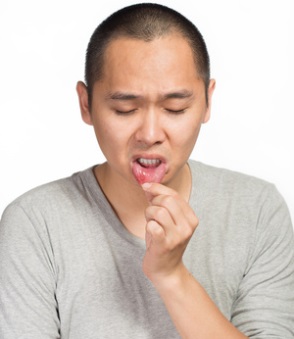Lip warts may be common warts, like those found on other areas such as the hands or face, or less commonly, they may be genital warts which have been spread to the mouth through oral sex. Warts are benign growths and are generally harmless, but people often prefer to have them removed. Especially with regard to warts on lips, people are concerned about the way warts affect their appearance and usually want to have them removed.
How do You Get Lip Warts?

Warts are caused by a virus known as human papillomavirus or HPV. Like any other viruses, including the common cold and influenza (the flu), HPV is contagious.
You have to get warts from someone else that has them. You can get them through direct contact, by touching someone that has HPV, or through indirect contact, by touching an object handled by someone with HPV. Sharing a towel, razor, or lip balm with someone that has warts is a good way to get warts on your face or lips. Warts can also spread to your lips from other parts of your body.
Because lips are moist, they may be more susceptible to the virus than many other body parts. Lips that are chapped or cracked are likely to be even more susceptible. It is possible to get warts on any part of your body, however. Warts on the hands and feet are common, as well as warts on the face.
People with compromised immune systems, like those with HIV or AIDS, those undergoing chemotherapy, or those that have recently been ill, are most susceptible but even healthy people can contract HPV and find themselves with lip warts. Not sharing personal items like towels, washcloths, razors, lip balm, and makeup is an easy way to help protect yourself from warts on the face and lips.
How Are Warts on Lips Removed?
Doctors have many options for removing warts from their lips. They sometimes freeze them off with liquid nitrogen, called cryotherapy or cryosurgery. They sometimes burn them off with a cautery tool, called electrocautery or electrotherapy. Sometimes they cut or scrape them off. Sometimes they use laser therapy to remove them. Sometimes doctors inject warts with powerful medication. The treatment of choice may depend on many factors, including how many warts you have on your lips, your medical history, and your preference.
People often prefer to use over-the-counter remedies for warts. Maybe they want something more affordable than surgery and other medical procedures, maybe they are concerned about pain or other potential side effects, or maybe they just prefer to avoid repeated trips to the doctor’s office. While there are a number of wart removal products you can purchase over the counter at drugstores and even grocery stores, it’s important to understand that many are not safe for use on lips or other mucous membranes, like in the mouth or on the genitals. Using these remedies in such sensitive areas may cause severe skin irritation or pain. Read the label carefully and check with the manufacturer, your pharmacist, and/or physician if you have any questions about whether a product is safe to use for lip warts.
Natural Remedies For Warts on Lips
Since many over-the-counter products aren’t safe to use on the lips, people sometimes turn to natural remedies. Even many of these aren’t meant to be used in such sensitive areas, however. We checked with the manufacturer of one popular natural remedy and were advised to keep it far away from all mucous membranes or else it would “burn really bad.”
However, we have found one product made from all-natural ingredients that are specifically designed to be safe on sensitive areas, including lips. The product is Terrasil Wart Removal Ointment and it contains essential oils and other natural ingredients that safely and painlessly remove warts while also soothing sensitive skin. You can follow the link to the Terrasil Website to learn more and see if it’s right for you.
